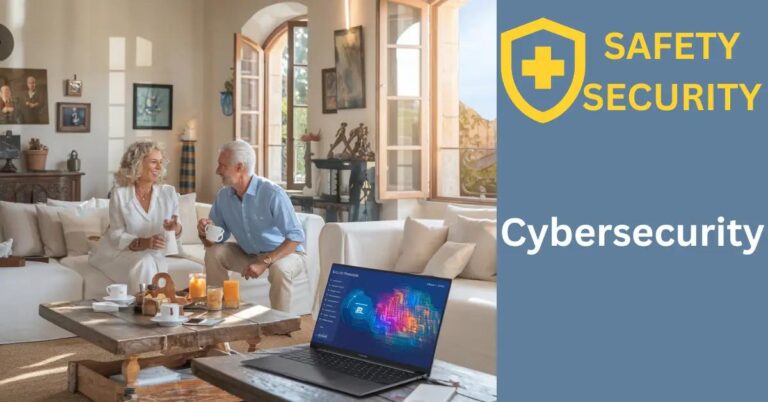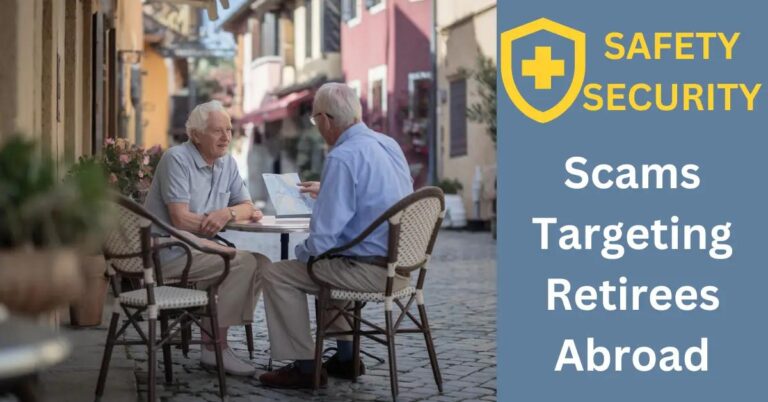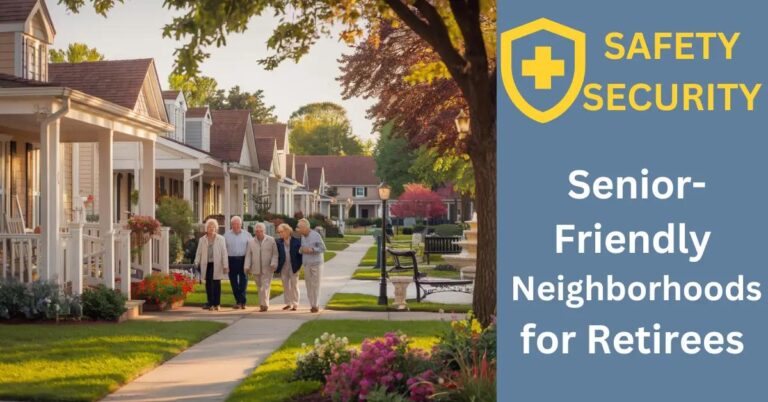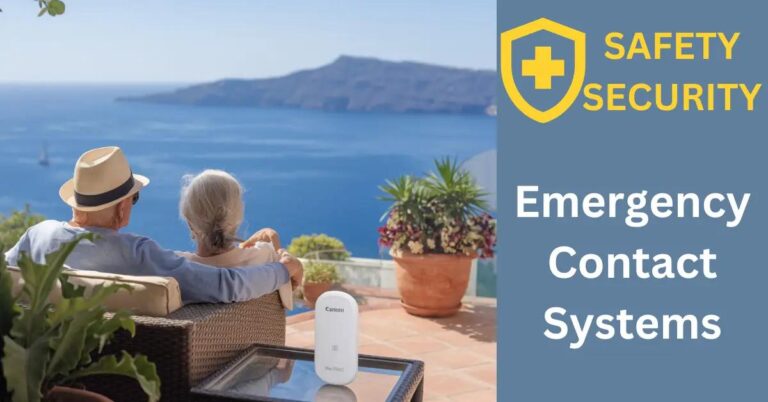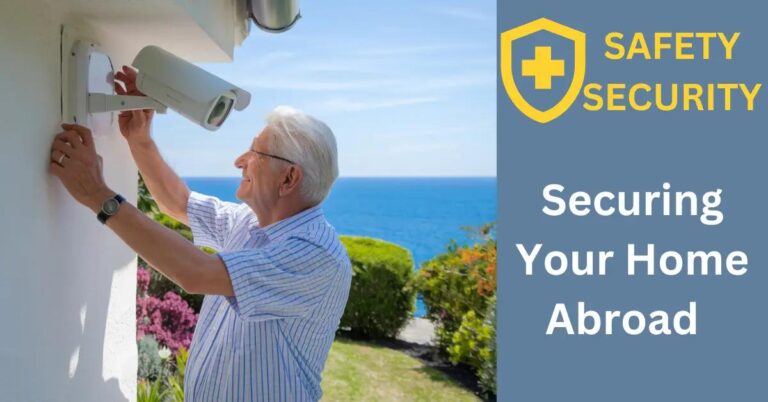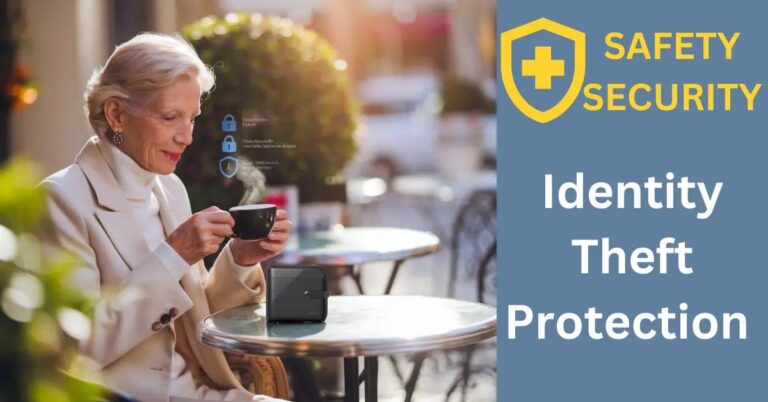TL;DR:
- Personal alarms are the best security tool for retirees abroad due to their ease of use in emergencies.
- Retirees should adopt safety measures like well-lit homes and awareness of surroundings.
- Personal safety items include whistles, money belts, and flashlights.
- Knowing the local language, scams, and laws enhances safety.
- Popular security systems for seniors include LifeFone and Medical Guardian, offering real-time alerts.
- Reliable devices for seniors should have clear displays and easy alerts.
- GPS trackers and mobile safety apps help in location tracking and emergency alerts.
- Insurance, technology like smart devices, and community support enhance security.
- Research locations, install security tech, and form local networks for effective safety when living abroad.
As you embark on this new chapter of life abroad, feeling safe shouldn't be a luxury—it's a necessity! Imagine exploring the vibrant streets of a foreign city with confidence, knowing you are protected by the right security systems. In our guide, we explore the need for personal security systems for retirees abroad. Discover why picking the ideal personal safety gear can make all the difference in your overseas adventure.
Are Personal Security Systems for Retirees Abroad Necessary?
Living abroad as a retiree brings unique safety needs. It's vital to understand and prepare for these challenges. Let's explore how to stay protected and enjoy your retirement overseas.
What is the best personal safety device? A personal alarm is your best tool. It's small and easy to use in emergencies. This alarm can deter attackers and alert others that you need help. Always carry it with you for peace of mind.
Adopting some basic safety measures is wise. Keep your home well-lit and lock doors and windows. Avoid isolated areas, especially at night. Stay aware of your surroundings to detect any unusual activity.
Personal safety gear is more than alarms. Consider a whistle for quick alerts and a money belt to secure valuables. A compact flashlight is useful too. These simple items can make a big difference in uncertain situations.
Awareness and preparedness are key to staying safe. Knowing the local language and customs can help you navigate situations smoothly. Educate yourself about common scams and local laws. This knowledge empowers you to react better in unfamiliar situations.
Keep this guide handy as well. It provides extensive personal safety tips for expatriates. Following these tips can increase your safety while living abroad.
By combining the right tools and habits, you enhance your safety overseas. Protective devices, practical routines, and knowledge of the local area contribute to your security. Embrace these practices to enjoy a secure and fulfilling life abroad. Stay safe.
How do you choose the best elderly security gadgets?
To choose the best elderly security gadgets, focus on features that ensure safety. The first thing to check is ease of use. Devices must be simple for seniors to operate without complex steps. For example, gadgets with big buttons and clear displays are ideal.
Another important feature is immediate alert ability. Look for devices that can send quick alerts in an emergency. Many gadgets now offer this through mobile apps or direct calls to a contact.
Detection sensors are also helpful. Some gadgets can sense falls or unusual inactivity. This adds an extra layer of protection by alerting you or a caregiver immediately.
When selecting gadgets, consider what others say about them. Reviews of top security gadgets can reveal what real users experience. Read reviews from those who bought and used the gadgets you're considering.
Affordability is another key factor. You don't have to break the bank to feel safe. Compare prices with features. Are you getting good value for your money? Price can vary by brand, features, and countries, so shop around.
Availability differs worldwide. Some gadgets may not be available in every country. Check the market in your area. UK residents may find easy options locally while others may need to order abroad.
Lastly, ask, "What is the best personal alarm for the elderly in the UK?" The answer lies in personal need. For some, a simple pendant alarm works well. Others might prefer wearable smart technology.
Remember, the best gadget always meets the user's specific needs. It's about finding what works best for individual lifestyles and preferences. Safety should feel personal and tailored to needs, no matter the location.
Which are the top security systems for retirees?
Choosing the right security system can be a bit tricky. What are the best personal security systems for retirees abroad? Answer: Systems that are easy to use and install. Let's dive deeper.
First, look for a system with simple features like emergency buttons or wearable devices. Many top systems offer real-time alerts to family or services. Some of the best include LifeFone, Medical Guardian, and ADT Health. These systems provide a smartwatch or necklace, which is very user-friendly for seniors. They let retirees feel secure by allowing them to call for help quickly.
Ease of installation is crucial. Many systems are “plug and play,” making setup easy without needing much help. Consider mobile app options, allowing checks and updates via smartphones. This feature helps families stay informed.
Comparing different systems is vital. Look for features such as GPS tracking, waterproof devices, or long-lasting batteries. Some systems include fall detection, calling for help if dangerous falls happen. It's these small details that make big differences in user experience.
Reading reviews helps in deciding. You can find many retirees sharing their thoughts about systems they use. Look for common themes like reliability or fast response times from service teams. Through these insights, we grasp which systems hold real value.
Lastly, cost often affects choice; balance quality and affordability. Some systems offer monthly plans, while others charge one-time fees. Make sure any system chosen is budget-friendly and offers support in the retiree’s location. Always check this information before buying anything.
Here is a resource where some systems have been evaluated. This helps verify choices based on solid research and experiences.
Research deeply, buy wisely, and ensure peace of mind. Safety can happen with the right systems in place.
Why Should Retirees Choose Security Services for Seniors Abroad?
When I talk about security services for seniors living abroad, one point stands out: peace of mind. Trustworthy security services provide safety and allow seniors to enjoy their retirement. So, how do we choose wisely? The key lies in identifying reputable services—look for trusted reviews and ask around in local expat circles.
Retirees have unique needs that differ from younger expatriates. Tailored security solutions are essential. These solutions can include emergency buttons, fall detectors, or even regular wellness checks. Such systems cater specifically to the challenges seniors might face.
Another critical factor is customer service and support availability. Quick and reliable support is vital. Knowing someone is available to assist at any time adds a vital layer of security.
When considering choosing security services abroad, evaluating service costs against benefits is crucial. A higher cost might offer advanced features like location tracking or rapid emergency response. Analyze what is truly necessary to ensure the investment is worthwhile.
In summary, security services for seniors living abroad are more than just gadgets or apps. Just as one would research a good doctor in a new country, researching and selecting the right security service enhances one's overall quality of life. Once retirees find a trustworthy service, tailored solutions, and excellent support, their lives become less stressful. That's the peace retirees deserve.
What Mobile Safety Apps Are Essential for Elderly Travelers?
When I ventured abroad, mobile safety apps became my new sidekicks. They are essential for elderly travelers seeking peace of mind. So, what is the best personal safety device? The top-rated mobile apps cater to this need by focusing on location tracking and emergency alerts.
I recommend apps like Life360 and bSafe. Life360 connects me with family, tracking my steps throughout the day. Features like real-time notifications help me stay informed about loved ones' whereabouts. Similarly, bSafe offers one-touch SOS alerts paired with location data—truly a lifeline when needed.
Accessibility is vital when discussing apps for seniors. Interfaces should be simple and clear. Both Life360 and bSafe excel in this, ensuring seniors can navigate without fuss. This ease of use allows even tech-averse travelers to benefit.
But safety is not only physical; online safety matters too. Apps seek to protect personal data. Using trusted software minimizes risks from hackers and phishing attempts. Maintaining vigilance about your online presence is key.
Are personal safety apps worth it? Yes, definitely. They offer personal security and help combat loneliness. Imagine a virtual community, supporting and connecting us globally. It's like having friendly neighbors always available, regardless of where we roam.
In choosing these apps, consider their compatibility with mobile devices and operating systems. It's vital to ensure they function smoothly on my phone model. Regular updates keep them current, adding new features and enhancements.
What features should the best apps have? Quick response times, battery conservation, and GPS accuracy are critical. Meanwhile, emergency contact integration is a must, extending safety to digital realms.
The right mobile safety app features can help us protect our well-being and stay connected to loved ones during our adventures. Venture out, anchor yourself with the correct application, remain connected, and enjoy your abroad experience!
What Home Security Options Are Best for Expats?
When choosing home security systems abroad, options abound. Advanced systems like monitored alarms, cameras, and motion sensors offer the most protection. They work with emergency responders, keeping you safe. Smart home technology integrates with these systems, allowing control from your phone. Use smart locks, lights, and security cameras to tighten your home's safety net.
For installation, consider DIY versus professional. DIY is cheaper, but it relies on you to install correctly. A professional setup ensures accuracy and reliability. Assess skills and time before deciding.
Living abroad often means renting. Securing rentals demands unique approaches. Temporary setups, like wireless cameras or sensors, avoid altering the property. For owned homes, wired options might be better for added stability.
Retirees need to feel secure in new homes. Reviews of personal security systems for retirees abroad emphasize ease and efficiency. Choose systems noted for reliability and top features like emergency buttons and quick alerts.
Research is crucial when selecting a security system. Trusted brands with strong customer feedback offer peace of mind. Look for features that suit your lifestyle and the unique risks of your location.
Installing the best security system isn't just about tech. It's about balancing costs, benefits, and personal peace. Good systems let retirees abroad live peacefully, knowing their home is safe.
How can retirees ensure international travel safety?
Staying safe while traveling abroad is important, especially for retirees. Start by planning ahead. Research your destination's health requirements and risks. Make a checklist of essential travel documents, such as your passport and insurance.
Insurance and Emergency Medical Preparation
Insurance is crucial when you travel. Secure comprehensive travel insurance covering medical emergencies. Check that it includes hospital stays and evacuation. Some countries ask for proof of insurance before you are admitted. Confirm what local medical services offer in your area.
Staying Informed About Destination-Specific Risks
Learn about possible risks at your destination. Stay updated about weather events and political situations. Enroll in your embassy's alert programs, like the STEP program for U.S. citizens. This keeps you informed about emergencies.
Cultural Sensitivity and Safety Awareness
Knowing the local customs and respecting them can keep you safer. Dress appropriately and be mindful of local practices. This helps avoid unwanted attention. Research local transportation options to choose the safest kind. Avoid sharing detailed travel plans online.
The cost of personal security systems varies. High-quality systems can be expensive. Yet, investing in security supports peace of mind. Personal alarms, mobile safety apps, and trackers can address many needs. Comparatively, these low-cost options add vital layers of safety.
Awareness and preparation ensure travel safety. Insurance, research, and respect go a long way. By following these steps, retirees can enjoy their adventures with confidence. Always have a plan and focus on safety. This approach is proactive and practical.
What are the communication gadgets for older adults living abroad?
Reliable communication is key for retirees abroad. But which gadgets offer the best safety? To address this concern, it's vital to choose devices that are easy to use and dependable. A good starting point is a mobile phone with a large screen and simple interface. Many options aim to simplify use, making them ideal for seniors.
A smartwatch is another helpful tool. It not only tells time but also tracks your location. Some models can send alerts to family in an emergency. Such safety features are essential for older adults living away from loved ones.
Keeping in touch with friends and family is easier with video calling apps. Applications like Zoom or Skype offer easy, face-to-face chatting. These apps work well even if you're not tech-savvy, because of their straightforward design.
Police often recommend having a personal alarm device. A personal alarm is a device that makes a loud noise to deter potential threats. It can easily fit in a pocket or on a lanyard.
Devices like the "Jitterbug Flip" phone are popular due to their large buttons and clear sound. This makes it easy for older adults to see and hear their calls. Some reviews highlight its simplicity as a key selling point.
Balancing between tech know-how and simplicity is crucial. Many older adults may not feel comfortable with advanced gadgets. Choosing gadgets tailored for ease of use increases safety and reliability. It’s vital to maintain connections, not just for safety, but also for emotional support.
Lastly, encouraging regular check-ins or scheduling calls can help maintain strong family bonds. Living abroad doesn't have to mean losing touch, thanks to the right communication tools. These gadgets help retirees feel safe and connected, even when far from home.
Why are medical alert systems crucial for expats?
Medical alert systems keep expats safe by linking them to help quickly. For retirees abroad, these systems act like a lifeline, ensuring assistance during emergencies. The key features include a wearable button or device that promptly connects you to a response center. Many systems also provide location tracking, ensuring help finds you wherever you are.
Are personal alarms for the elderly free? No, personal alarms usually require a subscription fee. The cost covers device features and the quality of response services. Choosing the right plan depends on your budget and expected features. Consider systems with reliable response centers that operate 24/7. Some companies offer lower costs, but they might lack essential services. Always compare service quality and price carefully.
Comparative analysis of popular medical alert brands reveals varying features and prices. Life Alert and MobileHelp are popular brands known for reliability. Life Alert offers a range of devices but usually at a higher cost. MobileHelp provides mobile and GPS-enabled solutions, valuable for active expats. These systems stand out for their response speed and customer support. Consider the specific features each offers when choosing.
How do subscription plans and cost considerations impact retirees? Subscription plans often include equipment rental and emergency response services. Plans range from basic to advanced, with GPS tracking and fall detection as optional services. Monthly fees vary; more features usually mean higher costs. Weigh your needs against costs before deciding.
The integration with existing healthcare setups abroad is crucial for seamless support. Choose a system that works well with local health services. Ensure that your chosen brand is recognized or compatible with healthcare providers in your host country. This can facilitate prompt medical attention in emergencies, enhancing your overall safety abroad.
How Can Elderly Retirees Access Emergency Response Services?
Elderly retirees often need emergency response services. These services come in many forms to fit specific needs. There are various types of emergency systems available for seniors. Personal alert devices and wearables, like pendants and wristbands, are popular. They allow seniors to call for help at the push of a button. Some devices also monitor health stats in real-time. These systems provide peace of mind for retirees living far from family or in a new country.
Local services often offer quicker response times due to their proximity. International companies provide broader coverage. They ensure help is available no matter where retirees travel. Making a choice between local and international services depends on one's lifestyle and travel habits. Local connections can provide immediate assistance. Meanwhile, international services can be advantageous for retirees frequently on the move.
Setting up a quick-response plan is crucial. Effective plans involve knowing immediate surroundings and emergency numbers. Retirees should keep essential documents and emergency contacts easily accessible. Clear action steps should be outlined in case of an emergency. Familiarity with local emergency protocols enhances safety. It prepares retirees to quickly access necessary assistance.
Building a network of emergency contacts is vital for any expatriate. This network includes healthcare providers, neighbors, and community resources. It extends beyond immediate family. Understanding the local community helps build a supportive safety net. A robust network ensures retirees are never isolated during emergencies.
Which emergency response system is best for you? Choose based on health needs, mobility limitations, and living location. Reviews of personal security systems for retirees abroad often highlight user-friendliness and reliability. It's important to select a system that you feel comfortable using. What matters most is how quickly help can be summoned, ensuring peace of mind for the retiree and their loved ones.
What Should Expats Consider About Insurance for Protection?
Insurance is vital for expats and retirees abroad to protect against unforeseen risks. But with so many options, what should you look for? First, review expat insurance for retirees' protection. This includes health, travel, and property coverage. Health insurance is crucial since local medical costs vary.
What are common gaps in coverage? Gaps often exist in dental care or emergency evacuation. Filling them requires add-ons, but they increase costs. Knowing these gaps helps you choose a suitable policy.
Consider if your policy covers existing conditions. Some policies exclude them, leaving you unprotected. Also, assess if your policy covers you both in your new country and back home.
Why is understanding policy terms important? You'll know exactly what you're buying. Policies should clearly state what they cover and don't. Misunderstanding these terms leads to denied claims. If a policy confuses you, ask the provider for clarity.
What is the cost of personal security systems for retirees abroad? Costs vary greatly based on needs, location, and chosen system. Budgeting will guide you to the right options.
Contacting insurance providers abroad is another step. Reach out to them to compare costs. Contacting them can also help clarify policy terms. Local providers might understand your unique needs better, and in some cases, offer customizable plans that you can't access from your home country.
Some insurers even have special plans for expats to bridge protection gaps. Research such options to ensure robust protection. Check this list of expat insurance options for your reference.
By following these steps, you minimize risks while living abroad. Security isn't just about locks and alarms—adequate insurance is essential.
How does technology support security for elderly abroad?
Technology plays a vital role in keeping seniors safe abroad. User-friendly tech devices for seniors are essential. Many gadgets now focus on ease of use, allowing even non-tech-savvy retirees to stay secure. Devices such as simple smartphones with large screen displays and programmable one-touch dialing can help.
Smart home devices promoting safety have advanced leaps and bounds. Products like automated lighting systems and smart locks serve as precaution tools against intrusions. They provide added security without complex installations. For example, lights that automatically turn on at night can deter potential intruders.
Another essential component is the upgraded security features in day-to-day gadgets. Many now have built-in emergency features. Smartphones, for instance, often come with SOS alerts that can be activated with a single button press. This feature proves critical in emergencies, giving peace of mind to retirees and their families.
Guidance on adapting to new technology cannot be overlooked. Retirees must familiarize themselves with these devices. It’s best to start with simple, senior-friendly tech for security purposes. For those eager to learn, many community centers and libraries provide tech classes specifically for older adults. Friends and family can also teach basic gadget use.
Adapting technology isn’t only about personal safety. It helps retirees connect better with loved ones, improving their quality of life. Video calls on tablets, for instance, help bridge long distances. This connection enhances both social and emotional security.
Security shouldn’t be overwhelming. Today's technology focuses on making devices as straightforward as possible. Seniors abroad don’t have to worry about complex setups. Manufacturers design products with an emphasis on simplicity, proving that adapting to modern technology can be not only possible, but also enjoyable.
What is the Role of GPS Trackers for the Elderly Abroad?
Yes, GPS trackers can play a crucial role for retirees living abroad. They help in locating someone quickly if they wander or get lost. It's like having a guiding star, especially when you're in a new place.
There are many GPS devices for seniors that serve different needs. Some are tiny and can fit in a pocket, while others can be worn as watches. It's important to pick the right one, as each type offers unique features catered to seniors' comfort and ease of use.
GPS-enabled watches can also be a good choice. They not only tell time but also show the wearer's location. This is handy for those who might not like carrying extra gadgets. These watches often have a feature for real-time location sharing, allowing family and friends to check in.
Standalone GPS trackers, on the other hand, are dedicated to tracking one's location. These devices might not have the same features as watches, but they typically offer longer battery life. This means less worrying about charging them every day, which can be ideal for seniors who like simplicity.
Real-time location sharing is a standout benefit of these trackers. It allows trusted people to see your location whenever needed. This feature offers peace of mind, knowing that help can arrive quickly in an emergency.
GPS trackers offer a sense of security and independence. Seniors can enjoy exploring new places without fears of getting lost. But, it's essential to discuss with them about their comfort and preference. After all, the goal is to ensure they feel safe and secure while enjoying their adventure abroad.
Are Personal Security Systems for Retirees Abroad Necessary?
When deciding on personal security systems as a retiree moving abroad, the choice of country matters. Some countries are renowned for retiree security due to certain factors. Countries like Portugal, Spain, and Costa Rica often top the list. Why? They have low crime rates and are generally peaceful.
How do we decide on safety? We look at crime data, healthcare quality, and political stability. Portugal, for instance, boasts a solid healthcare system and a friendly community. Costa Rica shines with its stable democracy and beautiful environment. Reading safety reviews of popular retirement destinations can help you make a choice.
Culture can play a huge role in how safe you feel. In countries like Japan, the cultural norm is respect for others' property and space. This contributes to lower theft rates. Spanish cultures often emphasize community support, providing a helping hand to retirees. It's essential to immerse yourself in these cultures to truly experience the safety they offer.
Community support for expatriates is key. In Portugal, there are several expat groups that provide support and advice. These communities often have events, helping new arrivals feel less isolated. They can help with everything from finding housing to understanding local customs.
While personal security systems might not seem essential everywhere, they offer peace of mind. Even in safe countries, having an extra layer of security is wise. Systems like cameras and alarms can be helpful. They deter crime and provide rapid alerts if an issue arises.
In summary, knowing which countries prioritize retiree safety allows better planning. Choosing a secure destination and engaging with local communities are essential. Understanding cultural dynamics enriches experiences and enhances your personal safety.
How Can Expats Secure Their Locations Effectively?
Securing your home abroad starts with understanding your neighborhood. Identify areas prone to crime and note the local culture and practices. Talk to neighbors and join forums to gather safety tips. Get to know the local authorities, as they play a big role in community safety. They are vital to report issues and seek help in emergencies.
Technology can enhance home safety. Install cameras and alarms that suit your needs. Consider systems that alert you on your phone, allowing you to monitor your home remotely. For example, smart locks let you control who enters your home, providing peace of mind when you are away.
Community involvement enhances safety significantly. Join local groups focused on neighborhood safety and participate in community events. Engaging with people provides a sense of security and creates a support network. Knowing you have people to rely on makes a difference when living far from home.
I find these steps important for anyone looking to feel safe and secure abroad. Evaluating your surroundings and using technology while engaging with locals offers the best protection. Start by understanding the environment around you and make it safer step by step.
How Do Personal Security Habits Shape Retiree Safety?
Personal security starts with habits. With good habits, retirees like us can enjoy life abroad. We first develop daily routines. These routines help us stay safe and alert to what's around us. Avoid dark streets at night and don’t flash valuables. Always know the way back to where you stay.
Building a network of local contacts is equally vital. Meeting neighbors and locals helps you feel at home. Local friends can guide you through cultural customs. They show trusted shops and markets. In case of need, they are your close help.
Cultural learning plays a big role in ensuring safety. Trying local foods and learning the language can open up a new world. Knowing basic phrases breaks barriers. Understand local laws to avoid problems. Respect the customs to blend in and not stand out as a target.
Recognizing and responding to threat indicators is crucial. Pay attention if someone follows you. Unusual sounds or movements can signal trouble. If danger arises, stay calm. Knowing escape routes can mean the difference in emergencies.
Here is a good resource to deep dive into more details about personal security abroad.
These habits shape our mindset and improve our safety. As retirees, these lessons are gifts we give ourselves. Each step prepares us to handle life’s challenges more confidently abroad.
Conclusion
In this article, we've explored top safety systems for retirees abroad. We discussed essential gear, necessary safety habits, and valuable mobile apps. I shared insights on choosing the best gadgets to secure your living space. Being prepared ensures peace of mind while enjoying retirement abroad. Embrace technology, engage with local communities, and always stay aware of your surroundings. This way, you can fully experience your new home while staying safe. Prioritize these security measures, and you can enjoy a worry-free retirement. Your safety matters most, so make informed choices and stay protected.


